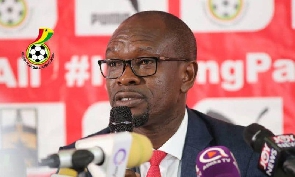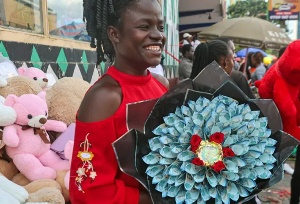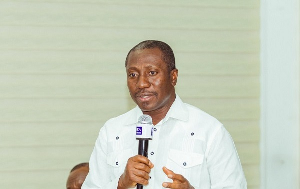By Dr. Michael J.K. Bokor
Friday, July 12, 2013
The Funeral Planning Committee has lined up a series of events to celebrate the first anniversary of the most tragic event ever to have hit Ghana—the death of a sitting president in the person of Professor John Evans Atta Mills. That event occurred at 2 p.m. on Tuesday, July 24, 2012, at the 37 Military Hospital in Accra.
The country stood still in grief, even long after he had been buried on Friday, August 10, 2012, in an area near the former seat of government at the Castle, Accra. That place now goes by the name “Asomdwee Park”—a fitting memorial for the interred former President who had endeared himself to many as an “Asomdweehene” because of what stood and fought for.
The clash of antagonistic political interests notwithstanding, we have remained intact as one people. Despite petty partisan political differences and anti-social activities in many parts of the country, Ghanaians have withstood the pressure to sustain their democracy. All too soon, one year has elapsed and his death is to be celebrated. As part of the preparations for the occasion, the Funeral Planning Committee is asking that corporate bodies and individuals wishing to make contributions and donations towards the event must follow certain procedures. Trust Ghanaians and their elaborate plans for such events. This will not be the first time that a past leader will be remembered in official ceremonies celebrating his life and works. But this particular one for President Mills brings to mind many issues that I seek to raise. The year-long centenary celebration of Dr. Kwame Nkrumah, that singularly illustrious son of Africa, took place in 2009. (He was born on September 21, 1909). That for Dr. Kofi Abrefa Busia has just been announced. The one-year celebration of Professor Mills’ death is in-the-making. Certainly, the moment of funeral celebrations is always dawning. Truly, Ghanaians love celebrating their dead: “Abusua d? funu”!
These celebrations represent more than a mere reverence for the departed dignitaries. They underscore the Ghanaians’ penchant for invoking the dead for inspiration or to concretize ties; hence, the claim that ancestral worship is a Ghanaian cultural norm. But celebrating the death of these past leaders doesn’t come any close to what is strictly regarded as ancestral worship.
They signify the fondness with which Ghanaians (at least those who value the lives and works of the departed ones) remember them. But the remembrance evokes more and raises disturbing questions:
What about the lives and works of these departed dignitaries has been upheld and developed to immortalize them? What have we learnt from them to improve the situation long after their death? Have we in any way done anything to prove that we are willing to sustain the legacy that they bequeathed to us? Or have we petulantly repudiated their works and rush to remember them on occasions of this sort just for the conviviality inherent in the celebration of the occasion? Or for political leverage only? The mere frolicking and drunken debauchery, not to mention the licentiousness engendered by the meeting of sexually active males and females spurred on by moral depravity, sexual laxity, and over-abundant intoxicants and stimulants? Ghanaian funeral celebrations have often provided the impetus for “baiting” by men and women seeking carnal pleasure beyond the wailing and gnashing of teeth that a funereal occasion entails. That is why funerals have been commodified in some parts of the country and aroused disapprobation among traditional rulers for them to ban expensive funerals or to impose strict regulations in a vain attempt to remove the “commercial” element from the purely funereal event. It is as if people cash in on such occasions and see funeral celebrations as an opportunity for wanton exploitation.
It doesn’t really matter whose funeral is being celebrated; but the situation becomes more glaring if it involves a well-to-do or an important public figure. Just visit one of such funeral grounds to see things for yourself—the mementoes being commercialized, funeral cloths produced and sold for profit, huge levies being imposed, and incessant calls being made for donations to make the funeral celebration an unforgettable one!
At the end of it all, the celebrants won’t hide their feelings: “Indeed, the funeral of so-so-and-so was really great!” They would keep saying so long after the dust has settled and wish for more.
I saw the funeral celebration of such important national leaders as Dr. Nkrumah, Dr. Busia, and Professor Mills and can tell the difference between what was done for them and the others, namely, Edward Akufo-Addo, Dr. Hilla Limann, and Dr. Joe de-Graft Johnson. For some, there was no formal official funeral celebration at their death. Defeated by the Fates, Gen. I.K. Acheampong, Gen. F.W.K. Akuffo, and Ekow Nkensen Arkaah (former Vice President) were seen off with little or no official ceremony to dignify them as former founts of authority. Don’t ask me why. Going through the list can reveal to us many intriguing issues to know why in death, such dignitaries couldn’t remain on the national horizon. By human designs, some ended up losing everything “dignifying” about them and were quickly consigned to the dustbin of history from where they would be occasionally “exhumed” for political jingoism and other gimmicks verging on ethnic politics.
Their good deeds would be easily brushed aside, their having been buried with their bones or sidestepped in the mad rush for frailties and foibles with which to condemn them as nation wreckers (depending on which political persuasion informs one’s assessment).
As a people, we can’t bring ourselves to recognize the humanity of those departed ones let alone to gear ourselves up to build on their legacy. After all, it wasn’t everything that happened under their rule that was bad. Take Osagyefo Dr. Nkrumah, for instance. What have successive governments done since his overthrow in 1966 to complete the laudable projects that he initiated but couldn’t complete before the dastardly CIA lackeys in the security services and main United Party opposition orchestrated his overthrow?
Have successive governments not looked on insensitively for those projects to either wither away or stand tall on the landscape as white elephants? Or unconscionably divested state-owned enterprises established by Nkrumah to themselves (using frontmen) and cronies? The GIHOC entities, Nsawam Cannery, and brick and tile factories, footwear industries, Kade match factory, and many more? The Tema Motorway (which has deteriorated over the years and the land near it encroached upon by greedy politicians and their cronies); the Tema silo project; and many others (Tarkwa gold refinery, Aboso glass factory, Black Star Line, Ghana Airways, Tema township project, Pwalugu tomato factory, and many more) remind us of our leaders’ lousiness. Even, the neglect of the mausoleum built to house this illustrious son is in a state of disrepair. Don’t even talk about his hometown, Nkroful, where he was originally buried before being moved to Accra for political expediency only to be treated with scorn and remembered only when someone in authority needs to bask in his glory!!
Don’t talk about Dr. Busia because he is the least acknowledged, even to the extent that his political opponents couldn’t stand seeing his bust in a part of Sunyani, the Brong-Ahafo Regional capital town. Of course, Dr. Busia means nothing to those who are quick to write him off like a bad debt. Yet, his rural development programme began putting national development on course, which the Rawlings government upheld to a good extent. How will his centenary celebration spur us on to action?
When we celebrate these leaders, what do we seek to achieve? What does the celebration help us do anew to move out country forward? What lessons have we learnt from their works and lives to prove that they are worth celebrating? Now, to the main issues regarding the funeral celebrations lined up for Professor Mills. Whatever ideals he stood and fought for are still fresh in our minds. Can we say that we are doing what his life, works, and death have challenged us to do for our country? Of course, he sought peace and preached it, earning the accolade “Asomdweehene” (even if his detractors won’t recognize him for it). He thrived on self-denial, moderation, and service to country and people. Beyond that, he functioned under the umbrella of a “Better Ghana Agenda” (even if he couldn’t accomplish as much as to satisfy his detractors). Then, he paid his dues to Nature, which is why feverish preparations are being made to celebrate his passing away. This is where I pause for sober reflection. Did Professor Mills leave the country united or divided? Could he have done so on his own? What part did we play in that? Above all, has his death taught us any lesson with which to intensify efforts for national development? Of course, as mortal beings, death to us is inevitable. That is why we must not act as if we are immutable and immortal. When death lays its icy hands on us, we will succumb to its entreaties and pass on to the land of no return. But we must endeavour to leave lasting prints on the sand of time.
We need to be reminded by the fate of those who have already gone that way to do what will make our memories worth celebrating by the living. More importantly, we need to realize that we have a country to serve and must do so unconditionally. Stealing the country’s wealth for the self is disgraceful. As the government mobilizes resources to celebrate the one-year anniversary of Professor Mills’ death, it must be reminded that the challenges facing the country are still enormous and daunting. Can the government say that it has done anything concrete to add to what President Mills left behind? What is it? Where is it?
Questions of this sort should influence anything that is to be done on the occasion. Otherwise, celebrating the life, works, and death of President Mills will have no value for the country and its citizens. Let’s celebrate the departed ones but we must resolve to go beyond the mere funereal element to do what will make them worth remembering. Only hard work, discipline, devotion, and the desire to be each other’s keeper will make that difference. Above all, working together to ensure national unity, stability, peace, and tranquility should be our clarion call. Then, we can continue to thump our chests that we are truly one nation, one people, with one common destiny. Celebrating one’s death with mere frolicking shouldn’t be the ultimate objective; it should be the catalyst to spur us on to live above reproach in seeking our country’s welfare. Therein lies the challenge. Should these past leaders return to life today, will they be proud of what we have done to the country they left behind? Will they congratulate or rebuke us for not doing our duties to put the country on an even keel? Will they be happy that Ghanaian technocrats and skilled workers are leaving the country in droves because the government of the day cannot create conducive environments for them to remain home and contribute their quota toward national development?
Will Nkrumah, for instance, be happy that Ghana has lost its glory as the world’s number one cocoa producer? That there is no consistent blueprint for national development? Or that nation-building has been turned upside down into a fierce rat race for looting the national coffers in the name of just anything? By just any device cooked up in officialdom by which the national coffers are raided in broad daylight? Disturbing questions to ponder as we celebrate these funeral anniversaries. Nothing less!!
I shall return…
• E-mail: mjbokor@yahoo.com
• Join me on Facebook at: http://www.facebook.com/mjkbokor
Opinions of Saturday, 13 July 2013
Columnist: Bokor, Michael J. K.














